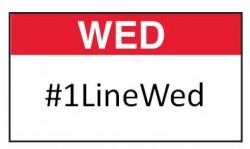For those unaware, #1lineWed is a weekly writing-related Twitter event hosted by the Romance Writers Association’s Kiss of Death Chapter (@RWAKissofDeath). The rules are simple—each week, @RWAKissofDeath will post a new “theme,” and writers post a line from their manuscripts that relates to that theme. Simple enough. So why is this a great writing exercise? Well, in the words of Stephen King: “Kill your darlings, kill your darlings, even when it breaks your egocentric little scribbler’s heart, kill your darlings.”
It is a common desire for fledgling writers to want to “stand out.” Often, this desire manifests itself as needlessly complicated writing. I’m certainly not above it – I still have issues sending my darlings to pasture. But step one in solving any problem is identifying it, and that’s where #1lineWed comes in.
Twitter posts are limited to 140 characters; “#1linewed” with a space takes up ten characters, so suddenly you’re down to 130. You’ll be stunned by how little room that is, but also how much you can pack into it if you’re cognizant.
Here’s a personal example. One week, the #1linewed theme was “sweet.” I located the following passage from my manuscript that seemed on-point:
“The voice of his mother echoed in his ears. It had been so long since he heard her voice. Too long. He had forgotten how similar his mother’s voice was to Carrie’s: both voices were sweet, steady, and calm. Both voices were like sedatives for his frenetic thoughts.”
This passage is almost 270 characters long, so I almost ignored it. But then I decided to experiment to see if I could get the character count down. After several iterations, I succeeded:
"He had forgotten how similar his mother’s voice was to Carrie’s: both were sweet and calm, sedatives for his frenetic thoughts." #1linewed
— Jason Huebinger (@JasonHuebinger) December 21, 2016
This passage is half the length, but much more impactful. And while it would take a very long time to take this approach with an entire manuscript, developing an eye for darling slaughter is critical to success as a writer.
— Jason Huebinger

